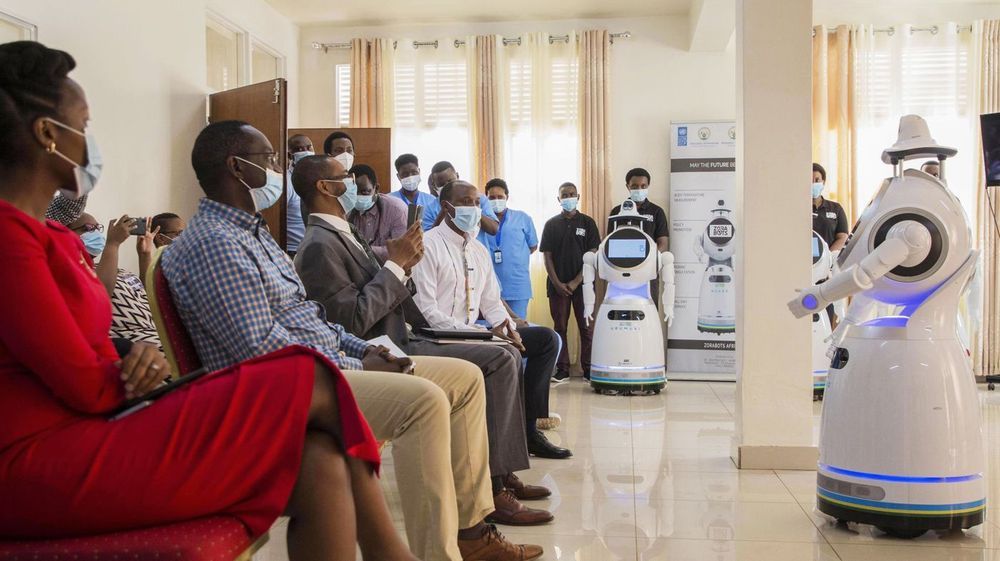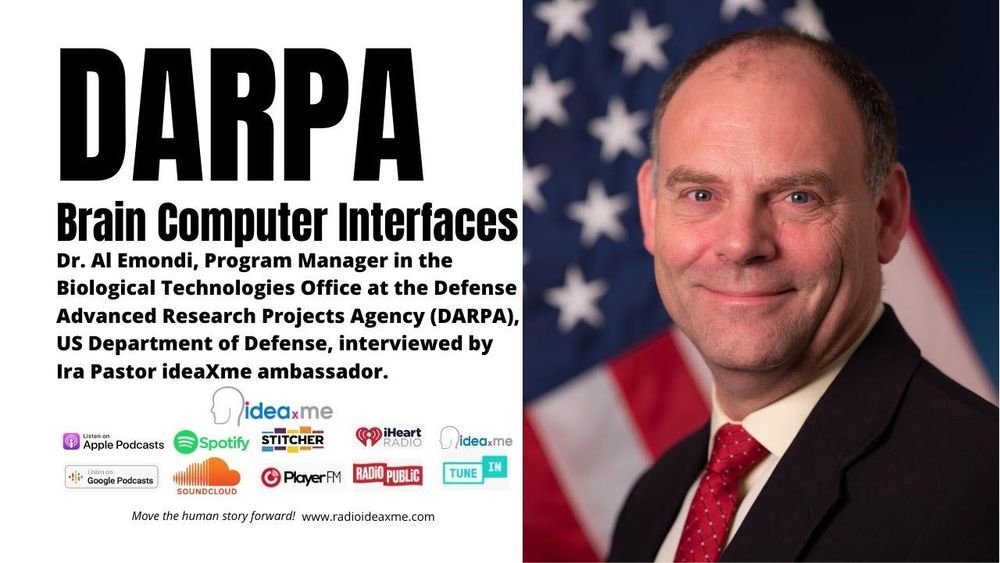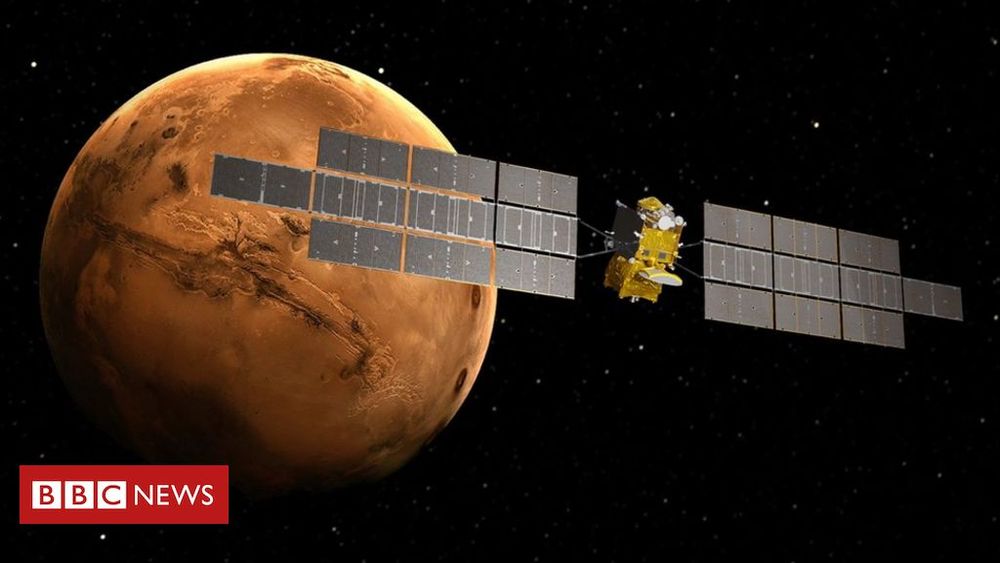Recent advances give theoretical insight into why deep learning networks are successful.


Recent advances give theoretical insight into why deep learning networks are successful.


If you are interested in brain computer interfaces (BCI), then you need to listen to this very exciting podcast!
I have only been aware of this DARPA NNN (Next-generation Non-surgical Neurotechnology) program since mid-March, and it is my number one topic of interest. I am interested in it because I have a plan for mind uploading to extend my life indefinitely — otherwise known as superlongevity in our group — but I have no interest in allowing anyone to drill holes in my head! DARPA is looking at ways for non-invasive methods of connecting the thoughts in our brains to computers. Over time, this could be a method to capture the thoughts and memories and emotions within my mind and transfer them into a computer substrate. And, to be clear, this mind upload will, in fact, be me.
Naturally, DARPA is not developing this so that I can upload my mind. This is part of their wounded warrior project, where they are trying to rehabilitate soldiers who have had the misfortune to have lost a limb. In addition to the non-invasive neural technology, they are working on haptics to provide a feedback loop for the sense of touch and temperature. They are also working on what they describe as third wave AI to support this technology.
The interview is with Dr Al Emondi, who has had a fascinating career in technology. He is the DARPA program manager in the Biological Technologies department.
I will always admire DARPA for its world-changing technology innovations!
Ira Pastor, ideaXme life sciences ambassador, interviews Dr. Al Emondi, Program Manager in the Biological Technologies Office at the Defense Advanced Research Projects Agency (DARPA), US Department of Defense.
Ira Pastor Comments:
Today, we are going to go down the fascinating pathway of advanced neuro-technologies and in doing so, are going to be joined again by our friends from theDefense Advanced Research Projects Agency (DARPA), which is an agency of the United States Department of Defense (DoD) which is responsible for the development of emerging technologies for use by the military with a mission to make pivotal investments in breakthrough technologies for national security, as well as a tangential mission to formulate and execute research and development projects to expand the frontiers of technology and science, often beyond immediate U.S. military requirements.
Brain-Computer Interface:
As some background to our discussion, a brain-computer interface (BCI) broadly refers to a neuro-technology that allows for a direct communication pathway between ones brain and an external device. BCIs differ from neuromodulation in that they allow for bidirectional information flow and are often directed at researching, mapping, assisting, augmenting, or repairing human cognitive or sensory-motor functions.
DARPA:
Over the past couple of decades, DARPA has been working on very sophisticated neuro-technologies that rely on surgically implanted electrodes to interface with the central or peripheral nervous systems, demonstrating achievements such as neural control of prosthetic limbs, restoration of the sense of touch to the users of those limbs, relief of otherwise intractable neuropsychiatric illnesses such as depression, and improvement of memory formation and recall.

Summary: New artificial intelligence technology can accurately predict how any chemical is going to smell to humans.
Source: UCR
A pair of researchers at the University of California, Riverside, has used machine learning to understand what a chemical smells like — a research breakthrough with potential applications in the food flavor and fragrance industries.

“This is not just twice as difficult as any typical Mars mission; it’s twice squared — when you think about the complexity involved,” said Dr David Parker, the director of human and robotic exploration at the European Space Agency (Esa).
“And this satellite that Airbus will build — I like to call it ‘the first interplanetary cargo ship’, because that’s what it will be doing. It’s designed to carry cargo between Mars and Earth,” he told BBC News.
Dr Parker announced the European aerospace company’s role in the Earth Return Orbiter (ERO) at a NASA-Esa briefing with reporters just ahead of Thursday’s launch of the Perseverance robot.

An Artificial Intelligence tool to help funders identify specialists to peer-review proposals for emergency research has been developed by Frontiers. It aims to help fast-track the allocation of funding, and in turn, accelerate the scientific response.
An Artificial Intelligence (AI) tool to help funders identify specialists to peer-review proposals for emergency COVID-19 research has been developed. It aims to help fast-track the allocation of funding, and in turn, accelerate the scientific response to the virus.
The open-access publisher Frontiers has specifically developed the recommendation tool to aid funders during the crisis by helping them identify new reviewers. Under normal circumstances, the review process for research funding typically takes place by committee and can take a matter of months. However, since the COVID-19 outbreak, experts have become less available, and the urgency of this situation commands a tighter timeframe.
Simona Grasso, adviser in health research and health innovation at the Research Council of Norway, said: “The reviewer recommender tool made available from Frontiers media, has been helpful and crucial in recruiting experts for our COVID-19 Emergency Call. Due to the short time to assess the proposals, the broad thematic areas of the call and the amount of received application, has been a challenge recruiting many experts with a profile that fully fits the applications. The AI-based recommender tool is straightforward, user-friendly and allowed us to speed-up the recruiting process. In three clicks we managed to get a full ‘application-customized’ list over potential reviewers and their relative contact information. This tool is highly recommended. ”.

Robotic augmentation is coming to a war zone near you. For now, the first stop bypasses the battlefield.

The most reliable predictor of a relationship’s success is partners’ belief that the other person is fully committed, a Western University-led international research team has found.
Other important factors in a successful relationship include feeling close to, appreciated by, and sexually satisfied with your partner, says the study—the first-ever systematic attempt at using machine-learning algorithms to predict people’s relationship satisfaction.
“Satisfaction with romantic relationships has important implications for health, wellbeing and work productivity,” Western Psychology professor Samantha Joel said. “But research on predictors of relationship quality is often limited in scope and scale, and carried out separately in individual laboratories.”

Do you agree Eric Klein?
The billionaire engineer, who also helped found the artificial intelligence research lab OpenAI in 2015, has consistently warned of the existential threat posed by advanced artificial intelligence in recent years. Despite this, he said he still feels that the issue is not properly understood.

There have been many landmarks in the history of artificial intelligence, from the formulation of the mathematical theory that inspired neural networks back in 1943, to IBM’s famous Watson AI beating two champion Jeopardy! contestants in 2011 to win a million dollar prize.
Future historians may look back at 2020 as a similarly important checkpoint on the road to AI dominance. Why? Because YouTuber Funk Turkey has created a new Led Zeppelin song using the power of AI.